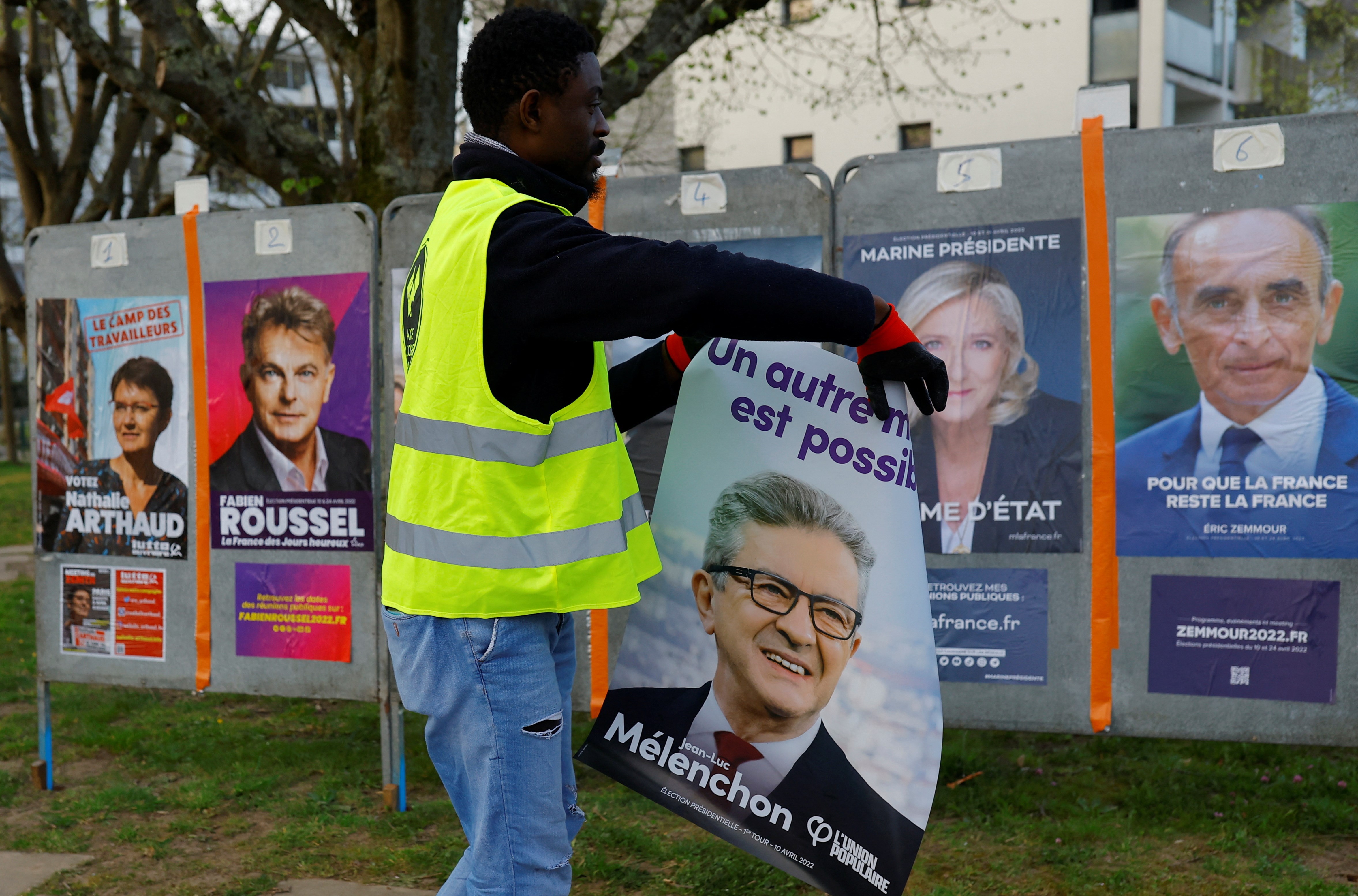France prepares for first round of presidential election
French President Emmanuel Macron is still ahead of his far-right counterpart, but will he remain ahead of her as the polls open early on Sunday or will Le Pen take his place?
-

France Affichage Plus workers paste official campaign posters of French Presidential election candidates on electoral panels in Saint-Herblain near Nantes, France, March 28, 2022 (Reuters)
France is setting the stage for a showdown between its presidential candidates projected to lead to run-off elections between the current President Emmanuel Macron and his far-right rival, Marine Le Pen.
Projections show that the gap between the two will be much tighter than it was during the last election in 2017, with some polls showing Macron only pulling 1% ahead of Le Pen.
Further political activity by candidates has been put on a hiatus until the election takes place early on Sunday morning, starting at 6 AM GMT local time.
Analysts warn that the outcome remains highly volatile with uncertainty remaining over voter turnout, with some experts fearing this round of elections will see the highest record of election boycott in France's history.
Projections may not hold true when it comes to reality, as the radical right-wing candidate has been facing much criticism over her beliefs that many have deemed racist and Islamophobic, but her ratings have been sky high, right at the heel of the incumbent President. Additionally, the biggest tranche expected to boycott the election is the French left, which would mean more votes for Le Pen.
The divide within the French electorate, which has them swaying between five candidates with somewhat different views, could be very harmful to Macron.
An Elabe poll, whose findings were published on Friday, predicted that Macron could win 26% of the votes, while it put his radical opponent just 1% behind him at 25%. Far-left candidate Jean-Luc Melenchon came in third place with 17.5%, and his far-right counterpart Eric Zemmour came in fourth with 8.5%. Republican candidate Valerie Pecresse came in fifth with 8% of the vote. All in all, Macron is projected to win 51% against Le Pen, poised to get 49%.
Macron, however, did not shy away from bringing up the war in Ukraine as a reason for his lacking, as he said he was not able to campaign as much as he would have liked to due to the situation in the eastern European nation.
Fear is still mostly about the electorate boycotting the election. Analysts fear that the 2002 record of the numbers of French voters boycotting a first-round (28.4%) is at risk of coming in second place in 2022, pushing the 2017 record of 22.2% to third place. Some analysts speculate that the 2002 record could still be in first place but the 2017 record will surely be overtaken this year.
The population of the electorate amounts to 48.7 million voters across mainland France and its islands in Canada, the Caribbean, and the Indian Ocean.
The odds are shaky for Macron, as no President since Jacques Chirac in 2002 was able to win a second term, though a win for him would surely go down in France's history, where it is very rare for presidents to renew their terms on the chair.
On the other hand, analysts also see that Marine Le Pen's election bid was aided by her more extremist counterpart Eric Zemmour, who was pulling ahead in the polls last year but whose push made his other far-right opponent seem more moderate.
Analysts are questioning whether Macron would be able to garner the same support from the anti-far right "Republican front" coalition, which landed him in the Elysee Palace and had put Jacque Chirac in his place over a decade before then when he was up against Le Pen's father in 2002.
Finally, Macron's reelection campaign has been met with quite the obstacle as he prepared to hold his first big rally today over his affiliation with the US consulting company, McKinsey and Co.
A report from the French Senate questioned the government's usage of private consultants and accused the American firm of tax dodging. Macron's rivals are using this to undermine his bid at reelection, and it is following him to his campaign stops just days before the April 10 vote, the first round of the elections.
Critics are describing the government's step of spending some 1 billion euros on a US consulting firm as some sort of "privatization" and "Americanization" of French politics, calling on the Elysee Palace to be more transparent.
The French senate controlled by Macron's opposition had published a report last month on the use of private consulting firms, and it found that Paris' spending on such contracts had increased two-fold over the past three years, despite questionable results. The Senate also put the issue of conflict of interest on the table.
All in all, Macron could be in hot water this election, and it is hard to tell who will emerge victorious and rule the French people for the next five years.

 5 Min Read
5 Min Read








